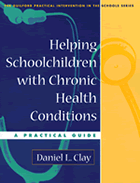|
PSYCHOLOGICAL
& QUANTITATIVE FOUNDATION
Clay's
Research Recognized, Leads to Practical New Book
 The
American Psychological Association recognized Counseling Psychology
Associate Professor Daniel Clay with a prestigious Early-Career
Research Award for his "significant contribution to research
in rehabilitation psychology in the first 10 years of his
career." The
American Psychological Association recognized Counseling Psychology
Associate Professor Daniel Clay with a prestigious Early-Career
Research Award for his "significant contribution to research
in rehabilitation psychology in the first 10 years of his
career."
Clay's research focuses on children with health problems
and disabilities. His latest book, Helping Schoolchildren
with Chronic Health Conditions: A Practical Guide, incorporates
knowledge gained from his scientific research and his clinical
experience into practical interventions for educators.
The book helps K-12 educators make sure chronically ill students
don't just fit in to the classroom, but thrive there. It provides
educators and school psychologists with a wide range of tools
for providing a welcoming and productive learning environment
to the estimated 10 to 15 percent of students who experience
chronic, significant health problems. Those problems include
everything from cancer and diabetes to asthma and AIDS.
The book provides multiple checklists, handouts, and intervention
strategies. It also explains in clear language some of the
more common chronic childhood ailments, including possible
side effects of medications and other treatments, and discusses
options for meeting federal rules under the Americans with
Disabilities Act and the Individuals with Disabilities Education
Act.
"This book is a gift to all of us who care for children with
special health needs," said Sharon Berry, Ph.D., a chief psychologist
at Children's Hospitals and Clinics in Minneapolis, Minn.
"I use the many resources in this book every week."
Clay said schools are terribly under-funded, and he saw his
book as a way to make it easier for them to accommodate students
with severe health problems.
"The goal is to keep these kids in schools and in regular
routines," he said. "Not just for educational reasons, but
for social reasons as well."
Classroom teachers will find the book especially helpful,
as it provides suggestions for dealing sensitively with the
parents of chronically ill students as well as for helping
the other students in the classroom understand why their ailing
classmates may look or behave differently.
"When a student goes away for cancer treatment and comes
back with no hair, you need to be prepared for that," Clay
said. "The book encourages educators to be aware of issues
before they become a problem in the classroom. Teachers can't
afford to wait until a student is teased."
On the other hand, Clay said, it's important for educators
to respect the privacy of a chronically ill child and his
or her family. Parents may not want a specific diagnosis shared
with classmates for fear that their son or daughter will become
ostracized. So the teacher must find a way to address the
issue in class while respecting the wishes of the ill child's
family. - by Stephen Pradarelli

|